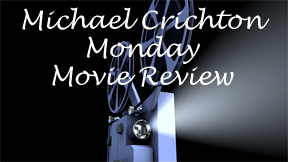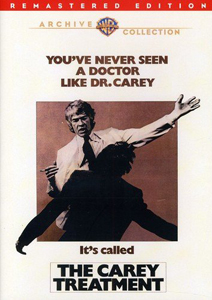I described Michael Crichton’s “A Case of Need” (1968, written under the name Jeffery Hudson) as a hardboiled medical mystery. But there’s the book version of “hardboiled” and then the film version. In adapting the novel, “The Carey Treatment” (1972) is unapologetically a vehicle for the suave and tough James Coburn (later of Crichton’s “Looker”) to do his thing as Dr. Peter Carey.
A proactive protagonist
He’s the replacement for the book’s Dr. John Berry, who I picture as a Crichton stand-in: gangly but not a pushover; someone who is in over his head but driven to do the right thing. In this case, that means seeing his innocent colleague, Dr. Lee (book)/Dr. Tao (movie), cleared of murder charges for a botched abortion of the daughter of a hospital president.
This is so much a Coburn-driven action-thriller that I imagine a “Dr. Carey” series of films was mulled by the filmmakers. The book’s Berry gets in gritty situations, sure – most memorably having to drill into his own skull to relieve pressure. But the film’s Carey creates the gritty situations, and they are all new under the pen of “James P. Bonner,” a pseudonym for the team of John D.F. Black (1971’s “Shaft”), Harriet Frank Jr. and Irving Ravetch.

“The Carey Treatment” (1972)
Director: Blake Edwards
Writers: John D.F. Black, Harriet Frank Jr., Irving Ravetch (screenplay); Michael Crichton (novel)
Stars: James Coburn, Jennifer O’Neill, Pat Hingle
After an opening stretch that establishes Carey’s ways with women – he immediately attracts hospital worker Georgia (Jennifer O’Neill) – he starts to toe the line of craziness. “The Carey Treatment” is almost one of those films where the hero catches breaks at every turn because the screenplay says he does. But at least Capt. Pearson (Pat Hingle, the 1989-1997 “Batman” films) is there to harass him, representing the almost-corrupt and certainly politicized Boston cops.
They want to put away Dr. Tao (James Hong) for being an abortionist (it was illegal at the time); they don’t care so much whether he performed this one. As soon as you hear Hong’s unique accent, you’ll expect him to say “I just do the eyes” – a la “Blade Runner” – but the truth is that Dr. Tao just does professional abortions, so this hack job can’t possibly be his.
A precursor to ‘Lethal Weapon’?
Carey’s first bit of craziness will wake you up if you’ve been in a pleasant doze. He interviews Lydia (Jennifer Edwards), the college roommate of the victim, probing her with questions about her sexual activity that may have been borderline in the 1970s and are definitely out of bounds now.

Then he takes the student on a drive meant to terrify her into telling what she knows. As Carey speeds along shoulders and eventually swerves along a beach, it’s like he doesn’t care if he (along with Lydia) lives or dies. He has become Martin Riggs 15 years before “Lethal Weapon.”
If it can possibly get weirder, the doctor-turned-sleuth’s next interview subject is the victim’s ex-boyfriend, a masseur named Roger Hudson (Michael Blodgett). Roger oils up our hero while the prone Carey questions him in a scene that would have sexual undertones today but is merely a bizarre measuring of power dynamics in 1972.
Still, I think the vibe of director Blake Edwards’ film is mostly intentional. At a dinner party, serial bachelor Carey chats up another woman, and the only outcome is that Georgia gets peeved. It’s not quite a swingers’ party, but we’re reminded this is a Boston of inconsistent and politicized pseudo-morality. Sleeping around is in bounds (especially for men), but abortion is out of bounds (especially for foreigners).
This notion carries over from “A Case of Need,” as do the core elements of the mystery and the way the good/nutso doctor solves it. Crichton’s Berry reaches the finish line through sheer will whereas the film’s Carey does so through borderline insanity. The alterations weren’t needed to make the story filmable. But “The Carey Treatment” is entertaining in its own way.

